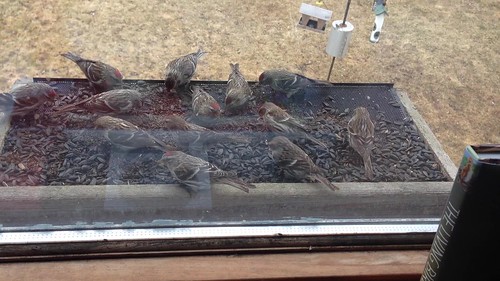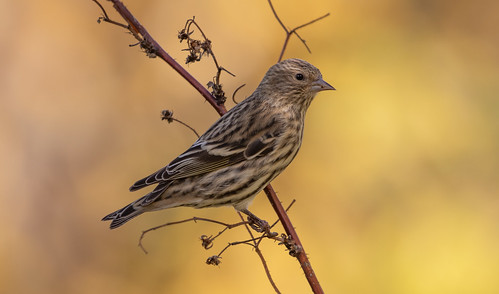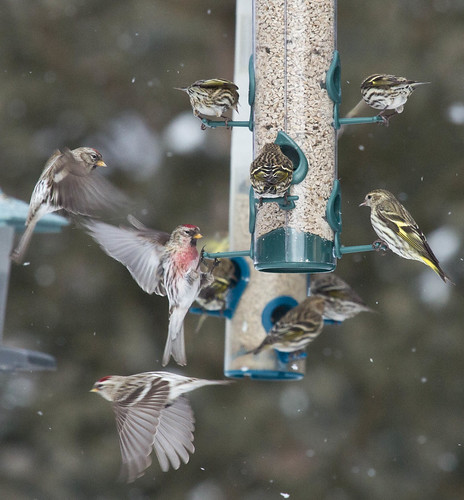Last week, the New York Times reported that salmonella outbreaks related to bird feeding have sickened 19 Americans between 2 months and 89 years old; 8 have been hospitalized. These cases have been reported in Washington, Oregon, California, Oklahoma, New Hampshire, Kentucky, Tennessee, and Mississippi. Dogs picking up sick birds have also gotten sick. The main birds appearing at these feeders are finches, especially Pine Siskins.
Birds get salmonella at feeders every year, but this is the first I’ve read of people getting sick, too. I probably should have expected it. Beginning late last summer, there’s been a huge movement of finches, many to areas with far milder winters than here in Minnesota and Wisconsin, and many to areas these finches don't usually visit. A lot of people would naturally be unfamiliar with such huge flocks of birds and would never have heard the annual warnings about keeping feeders clean.
 |
| Common Redpolls and other finches crowd together in feeders and on the ground below. |
Pine Siskins winter in California every year, but this year’s numbers are much larger than usual. And because of the pandemic, more people have been paying attention to backyard birds and starting up bird feeding stations—again, novices who are unlikely to have learned the basic principles of feeder sanitation.
Almost every year since we moved to Duluth in 1981 (except this one, so far), we’ve had a surge of redpolls and other winter finches as the snow starts to recede in late March and early April. Winter finches are flocking species that feed and roost in very close proximity, and also are ground feeders, many eating on the ground as others eat above them in the feeders. This lifestyle usually works just fine, but not when that seed on the ground gets moldy or contaminated by pet, rodent, and wildlife droppings.
Educated humans understand the importance of protecting our food supply at all levels of food production from farm to kitchen. But in our backyards, thanks to dogs, squirrels, rabbits, mice, deer, and all the other mammals and birds that wander through, seed on the ground can easily be contaminated with salmonella, E. coli, and other pathogens—this is why it’s important to keep the ground beneath feeders kept tidy. When quail, doves, sparrows, finches, and other ground-feeding birds are visiting, it’s critical to offer only small amounts that will be consumed that day—that prevents seed from getting moldy, plus any leftovers attract the rodents whose droppings are implicated in many salmonella outbreaks for humans as well as birds.
Thanks to the current pandemic, we humans have figured out how important social distancing is when there are disease organisms about. Indeed, with mask-wearing and social distancing, the number of cold and flu cases this year are way, way down. But tragically, we haven’t been able to convey these important public health concepts to birds.
Here in Duluth, every year I hear of a few cases of sick birds, and I explain to people why it’s important to keep the ground beneath feeders clean. When a sick bird does show up, it’s important to close down the feeder until the bulk of the finches move on in hopes that the larger flocks will break into smaller groups. And then thoroughly clean the feeders before setting them out again. Except for one time when I saw a sick redpoll, I just use a stiff brush and hard spray of water to clean my feeders a few times a year. I clean my bird baths every two or three days because I also want to keep mosquitoes from breeding in them.
To prevent further cases of salmonella, the C.D.C. recommends cleaning bird feeders and bird baths at least once a week or when they are dirty. They recommend that people avoid feeding wild birds with their bare hands, and that they wash their hands with soap and water after touching a bird feeder or bath, or after handling a bird. I’ve never worn gloves to deal with my feeders or birdbaths, and not when I hand-feed chickadees either, but I am careful about hand washing. All the public service announcements about hand washing when COVID-19 first hit reinforced that.
Now I’m hearing people say how dirty birds are, when birds are getting sick because our feeding stations are dirty. We Americans expect the restaurants we visit to meet public health standards, and expect that when invited to a friend’s for dinner, they’re using good hygiene, too. How can we judge birds harshly for expecting the same?


